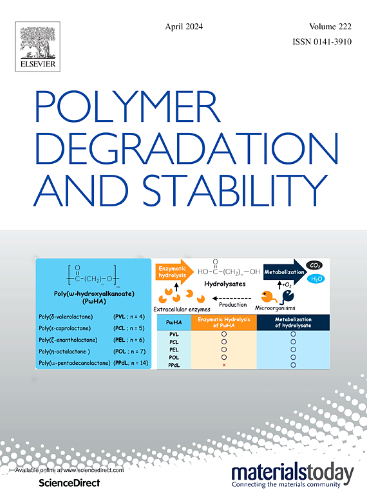Incorporation of bio-based 1,5-pentanediol to fabricate thermoplastic elastomers with high resilience and biodegradability
IF 7.4
2区 化学
Q1 POLYMER SCIENCE
引用次数: 0
Abstract
In this paper, we present a direct synthesis method for producing thermoplastic elastomer with high resilience and biodegradability by simply incorporating 1,5-pentanediol (PeDO), a bio-based monomer with odd carbon atoms, to poly(1,4-cyclohexandimethanol succinate), instead of using polyether soft segment. The incorporated PeDO is able to make the crystalline and amorphous regions of the copolyester reach an equilibrium at molar content of 40 %, resulting in novel thermoplastic elastomer with remarkable resilience (shape recovery ratio over 70 % at 200 % strain), exceptional mechanical (elongation at break over 1200 %). Meanwhile, it has excellent thermal stability and biocompatibility. Unlike traditional thermoplastic polyether ester elastomers that are difficult to degrade, this elastomer also possesses excellent degradability, with a mass loss of 100 % after a 6 days degradation in enzyme solution at 37 °C. This study developed a novel, concise, and efficient construction method for the fabrication of thermoplastic polyester elastomers based on thermoplastic semi-crystalline polyester, without using polyether soft segment, thus obtain novel and sustainable thermoplastic elastomers with good biodegradability and biocompatibility.

加入生物基1,5-戊二醇制备具有高回弹性和生物降解性的热塑性弹性体
在本文中,我们提出了一种直接合成具有高回弹性和可生物降解性的热塑性弹性体的方法,即将具有奇碳原子的生物基单体1,5-戊二醇(PeDO)与聚(1,4-环己二甲醇琥珀酸酯)结合,而不是使用聚醚软段。加入的PeDO能够使共聚酯的结晶和非晶态区域在摩尔含量为40%时达到平衡,从而产生具有显着弹性的新型热塑性弹性体(200%应变时形状恢复率超过70%),卓越的机械性能(断裂伸长率超过1200%)。同时具有优良的热稳定性和生物相容性。与难以降解的传统热塑性聚醚酯弹性体不同,该弹性体还具有优异的可降解性,在37°C的酶溶液中降解6天后,质量损失为100%。本研究开发了一种新颖、简洁、高效的基于热塑性半结晶聚酯制备热塑性聚酯弹性体的施工方法,无需使用聚醚软段,从而获得具有良好生物降解性和生物相容性的新型可持续热塑性弹性体。
本文章由计算机程序翻译,如有差异,请以英文原文为准。
求助全文
约1分钟内获得全文
求助全文
来源期刊

Polymer Degradation and Stability
化学-高分子科学
CiteScore
10.10
自引率
10.20%
发文量
325
审稿时长
23 days
期刊介绍:
Polymer Degradation and Stability deals with the degradation reactions and their control which are a major preoccupation of practitioners of the many and diverse aspects of modern polymer technology.
Deteriorative reactions occur during processing, when polymers are subjected to heat, oxygen and mechanical stress, and during the useful life of the materials when oxygen and sunlight are the most important degradative agencies. In more specialised applications, degradation may be induced by high energy radiation, ozone, atmospheric pollutants, mechanical stress, biological action, hydrolysis and many other influences. The mechanisms of these reactions and stabilisation processes must be understood if the technology and application of polymers are to continue to advance. The reporting of investigations of this kind is therefore a major function of this journal.
However there are also new developments in polymer technology in which degradation processes find positive applications. For example, photodegradable plastics are now available, the recycling of polymeric products will become increasingly important, degradation and combustion studies are involved in the definition of the fire hazards which are associated with polymeric materials and the microelectronics industry is vitally dependent upon polymer degradation in the manufacture of its circuitry. Polymer properties may also be improved by processes like curing and grafting, the chemistry of which can be closely related to that which causes physical deterioration in other circumstances.
 求助内容:
求助内容: 应助结果提醒方式:
应助结果提醒方式:


